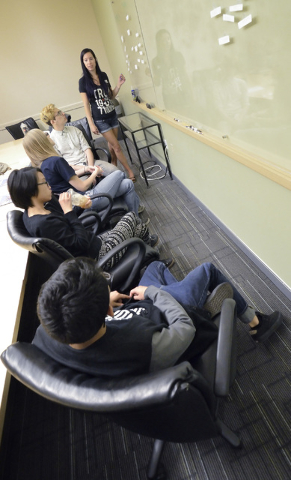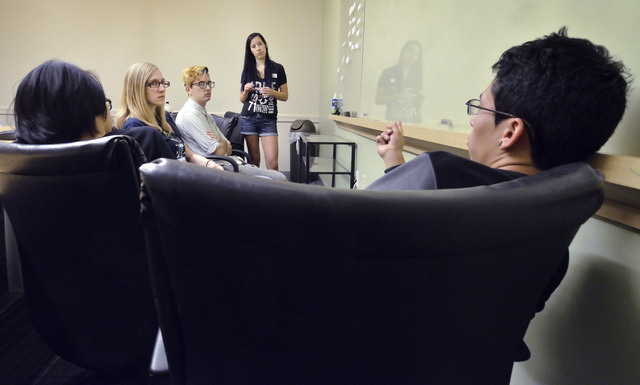Students discuss truths, myths and questions in sex ed program
Sidney Christian stepped up to a bulletin board, pulled off a slip of paper and began reading a statement written on it.
“Once consent is given in a relationship, it can’t be taken back,” he said, examining the words.
Thirty-two pieces of paper — covering topics such as teen dating and domestic violence — were posted on the board inside a Gay and Lesbian Community Center of Southern Nevada conference room.
One by one, the four students attending the comprehensive sex education class grabbed the statements and placed them into one of three categories: “truth,” “myth” and “unsure.”
Christian easily identified his statement as “myth.” The exercise continued as each student read statements.
“You can put it in the ‘unsure’ category,” instructor Brittany Freer said after one statement. “It is a legitimate category. We can talk about the ones you are unsure of after.”
Consent and dating violence are just a couple of issues the center is covering in its newly formed sex education program.
In classes for the 14-week program, which meet from 3 to 5 p.m. Tuesdays and Thursdays, students also discuss sexually transmitted diseases, contraception, date rape, sexual orientation, gender identity and abstinence. They also discuss questions that weren’t answered in their high school’s sex education class.
Cameron Catton, the center’s youth services manager, said a youth group discussion at the center prompted the program’s formation. Many of the youth group students, he said, found the Clark County School District’s sex education curriculum lacking.
The school district was criticized in 2014 for proposing sex education program changes during invitation-only meetings. The controversy ended in an apology by the superintendent and a renewed effort by the district to involve the community in shaping curriculum.
“They were saying sex education consisted of pictures of anatomy and that’s about it,” Catton said.
After receiving a federal grant, the center was able to present its first sex education program last year.
“This is the second semester,” Catton said.
The class is slated to be offered again July 2 through Sept. 29. Students must be at least 13 and have parental consent.
Freer and Guy Calderon-Cooper, who is also a licensed clinical professional counselor, lead the classes. Besides covering lessons, they answer the youths’ questions candidly.
Participants are encouraged to attend every class, but this semester, attendance has fluctuated, Catton said, from as few as four to as many as 17.
Students must complete 75 percent of the material to get certification.
Students in the center’s program say myths such as “women can’t get pregnant their first time” or “if people have sex standing up they can’t conceive” still exist in Clark County schools.
Other myths, they say, include the idea that a girl can determine whether she has a sexually transmitted disease by squeezing a lemon on her vagina, or that someone can get pregnant with twins from anal sex.
“I’ve heard students make false statements about HIV transmission,” student Armando Amaya said. “I thought they might be joking but then realized they weren’t.”
Catton said he even talked to a student — who wasn’t a part of the sex education program — who was concerned that she could get pregnant after a guy ejaculated on her leg.
These misconceptions can carry over into adulthood, Cooper suggested. He teaches a college course on human sexuality and said students are still unfamiliar with basic anatomy.
“I had a student ask why he had to learn about AIDS since he is straight,” he said.
But at the center, students said they feel free to ask things they might avoid asking in a traditional school sex ed class.
“They have the freedom to use slang language, but then actually learn the accurate terminology,” Catton said.
“Students are too afraid to come to their parents with these questions,” Catton said. “It is unfortunate that schools aren’t sharing this information and parents aren’t talking about it either.”
Freer said another issue is that teachers in traditional class settings would often rather say nothing than ruffle feathers.
“Sex education is very politically correct,” Freer said. “If we don’t teach them, kids are just going to learn through experience. They are setting themselves up to get hurt that way. This could be detrimental to their lives.”
Freer added that schools don’t have many opportunities to talk about healthy relationships, which students have plenty of questions about.
Although only four students showed up for this center class, they came ready to ask questions and challenge answers they found confusing or unsatisfying.
In the two-hour session, students asked about relationships and whether people were toxic or abusive in certain situations. Paper slips in the statement exercise addressed these topics, reading, “Rape only occurs when there is penetration” or “Consent is impossible to obtain if someone is drunk.”
Christian said he likes that the curriculum covers sexual orientation and identity.
“I think our generation is more comfortable talking about it,” he said.
Townsend said she wishes schools would talk about gender identity after witnessing several friends struggling with questions.
“High school is stressful enough as it is,” she said. “Having to struggle with your gender identity on your own shouldn’t be another part.”
She added that putting this into sex education curriculum at school could help decrease instances of bullying toward LGBT students.
Even if someone doesn’t have questions about their sexual orientation or doesn’t identity as LGBT, teaching this material can teach tolerance.
“You learn to be respectful,” Catton said.
The center’s class also differs from other comprehensive sex education programs, Catton said, because its language tends to be more inclusive.
“Usually, sex education classes are hetero-normative,” Catton said.
This means classes are taught with the assumption that relationships are only between men and women and that students identify only with their birth gender.
Catton hopes that the tide is changing within the school district. He said that in the past few years, students and organizations have discussed making the school district’s sex education more comprehensive.
“I don’t see (sex education in schools) changing in the near future,” Catton said.
Contact reporter Michael Lyle at mlyle@reviewjournal.com or 702-387-5201. Follow @mjlyle on Twitter.
RELATED
CCSD’s secret sex education talks fuel parent ire
CCSD kids talk sex education on ‘Daily Show’






















